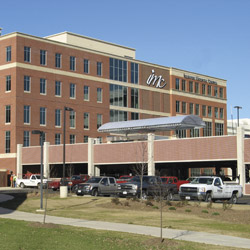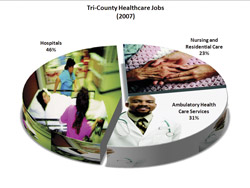
One of the most visible and fastest growing sectors of our economy in central Illinois is the healthcare industry. Representing over 15 percent of the workforce in the Tri-County Area, healthcare is one of the top industries, along with manufacturing and transportation. Everywhere you look, you can see expansions in the healthcare industry occurring, from the new medical offices going up on Knoxville Avenue and growth on Route 91 to the hospitals downtown. There are more than $700 million in capital projects recently completed, currently underway or planned to begin in the near future. Healthcare is a booming industry for our region.
We have an outstanding reputation for providing quality healthcare. The region boasts of having two designated magnet hospitals— Methodist Medical Center and OSF Saint Francis Medical Center—for excellence in nursing services, the nation’s highest honor in patient care. Methodist Medical Center received the 2006 Lincoln Gold Award for Performance Excellence, the highest honor awarded by the Lincoln Foundation, an Illinois quality organization. The Children’s Hospital of Illinois Neonatal Intensive Care Unit (NICU) was recognized for being the top-performing NICU in the world based on patient outcomes for 2005 to 2007. There is a long list of awards and recognition and a lot to be proud of in this industry.
In addition to award-winning hospitals, we also have leading education institutions. Illinois Central College has a variety of programs in the healthcare industry. Bradley University, Methodist College of Nursing, OSF Saint Francis College of Nursing and Robert Morris College all offer nursing programs and Midstate College offers programs in Allied Health. Peoria is also home to the University of Illinois College of Medicine at Peoria. The area is fortunate to have top-notch education programs to feed qualified medical professionals into our local workforce.
Central Illinois has a lot to celebrate when it comes to the healthcare industry. Yet there are challenges as well. As the population of our region grows and ages, the demand for healthcare professionals is increasing. The Illinois Department of Employment Securities projects that from 2004 to 2014, more than 5,000 jobs will be created in the healthcare industry, a 21 percent growth in workforce. That growth represents 25 percent of the total growth in all industries, making it the fastest-growing industry in the region. The challenge is that careers in the healthcare industry require specific training.
The current education programs offered in the region cannot keep up with the demand of the healthcare industry. There is a shortage of capacity in the education programs, due in part to a shortage of healthcare educators. We are already seeing a shortage of physicians in the region to cover the demands in a variety of subspecialties, as well as in primary care. This shortage does not include the impending retirement of a large group of baby boomers.
The Economic Development Council for Central Illinois’ Healthcare Services Strategy Group has identified these challenges and is proposing strategies to overcome them. The three main challenges that the Healthcare Services Strategy Group has identified are:
- Recruitment of surgeons and sub-specialty physicians to the region
- Shortage of educators in the medical field
- Shortage of capacity in current available healthcare education programs.

The Healthcare Services Strategy Group will be conducting focus groups to further identify the depth of these challenges. They will meet with several entities, including healthcare recruiters from the hospitals, current medical residents from the College of Medicine, newly recruited physicians and directors of the hospitals and medical groups to begin to identify the specific challenges the region faces in recruiting physicians. They will also conduct focus groups with current educators and educational institutions to help identify the challenges in recruiting educators in the medical field.
The Healthcare Services Strategy Group will recommend policies to help combat these challenges. Future initiatives of the Healthcare Services Strategy Group include exploration of the Quality Quest and Chartered Value Exchange initiatives, identifying opportunities for rural healthcare programs and possible grants, and recommending a comprehensive public relations campaign to build awareness of the medical community to help with physician recruitment.
Regional collaboration will be key to overcoming the workforce shortage. One example of successful collaboration is the Grand Victoria Pathways to Successful Healthcare Careers program. In 2003, a shortage of nurses and medical assistants was identified, and 10 community partners and four local hospitals came together to create a healthcare pathways program. The program is available to incumbent healthcare employees who are looking to move up the career ladder. A career plan is developed and the project manager assists each candidate to identify and enroll in the appropriate training program. Financial support from Grand Victoria Foundation and funds from the hospital are used to cover tuition costs, and program participants are also eligible to receive childcare and transportation assistance. So far, the program has provided scholarships to 125 incumbent workers and placed more than 50 workers in healthcare careers. This is a successful example of what can happen with regional collaboration.
We have a lot to celebrate when it comes to the healthcare industry in central Illinois. State-of-the-art facilities are rising and expanding all around us. As the fastest growing industry in our economy, it is important that we pay special attention to it and the development and attraction of its workforce. Collaboration is key to any successful workforce recruitment initiative, and we are looking forward to the insights the Healthcare Services Strategy Group will find through the focus groups and a collaborative program that will come out of the findings to begin to overcome the challenges we currently face. If you are interested in serving on the EDC’s Healthcare Services Strategy Group, please call Jessica Moroz at (309) 495-5956. iBi

